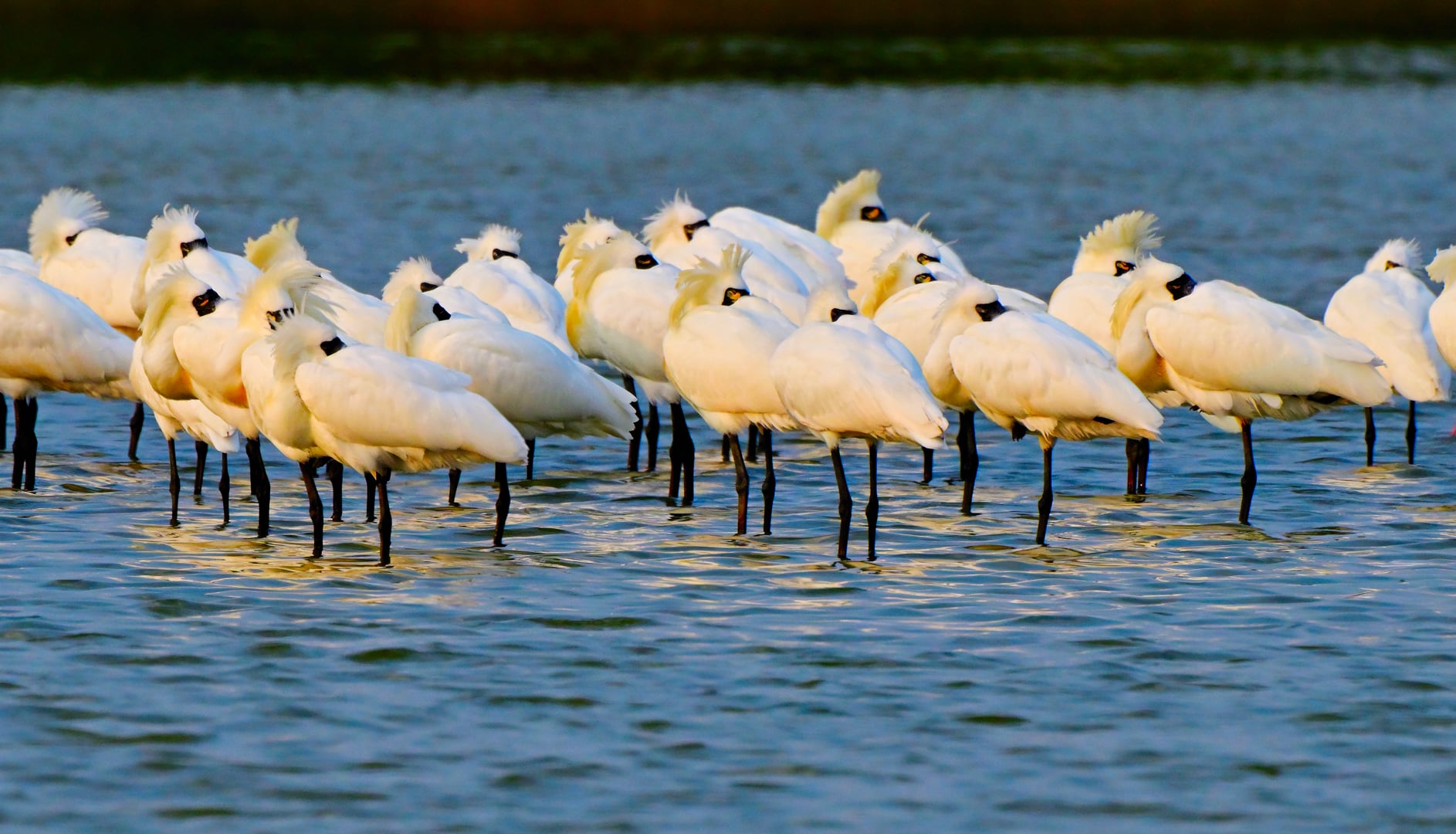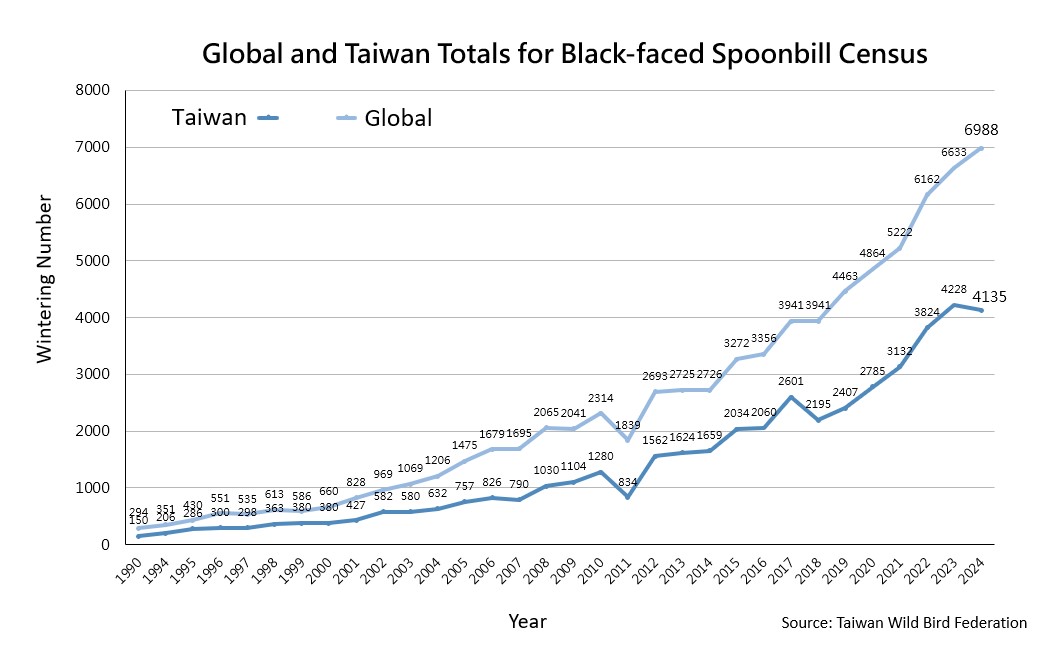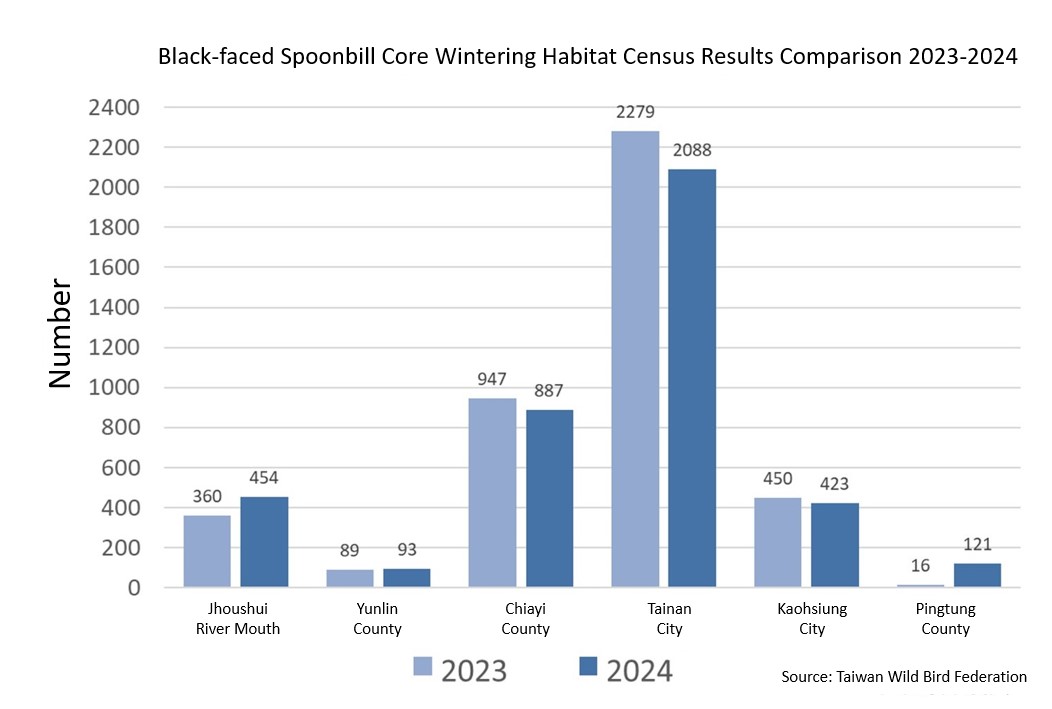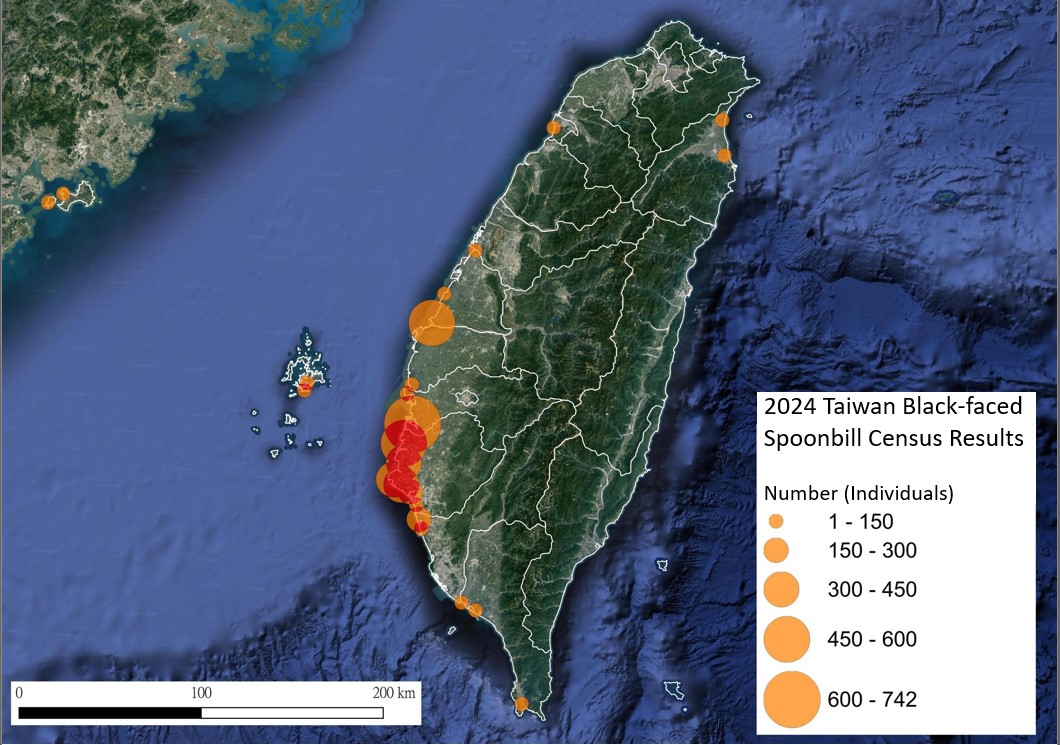Decrease in Black-faced Spoonbill Numbers Emphasize Need for More Habitat Monitoring

Photo: Philip Kuo
- Results from the 2024 Taiwan Black-faced Spoonbill Census showed a total of 4,135 Black-faced Spoonbills in Taiwan, a decrease of 93 from the previous year
- Done in coordination with 2023 International Black-faced Spoonbill Census organized by Hong Kong Bird Watching Society; this year 6,988 birds were recorded, a new record
- Taiwan's numbers comprise 59.2% of the global total
- To better understand habitat-related issues and population changes, long-term monitoring and working with stakeholders is required
Results of the 2024 Taiwan Black-faced Spoonbill Census revealed a total of 4,135 spoonbills wintering in Taiwan proper and its outlying islands, down 93 from the year before. With annual census numbers consistently showing 50% to 60% of the global population, Taiwan is one of the most critical wintering areas for the iconic and globally threatened species. This year's survey took place January 19-21. Supported by the Taiwan Forestry and Nature Conservation Agency, the Taiwan Wild Bird Federation organized the event in Taiwan, working with birders, bird societies, government agencies, and other groups from all over the country to conduct the census. In recent years, over 100 surveyors have been required to accurately conduct the count.
Global Population Continues to Grow, Taiwan Numbers Remains Stable with Slight Decrease
The count was done in coordination with the 2024 International Black-faced Spoonbill Census. This event, organized by the Hong Kong Bird Watching Society, sees participating groups representing all of the migratory waterbird's range take part. With a total of 6,988 birds recorded, an increase of 355 individuals from 2023, it shattered the global record set just last year. Taiwan once again had the largest number, representing 59.2% of the total. However, it decreased by 93 individuals compared to last year, marking the first decline since 2018. The next highest totals came from China with 1,630 (23.3%), Japan with 702 (10.1%), and Hong Kong and Shenzhen (Houhai Bay) with 375 (5.4%).
Results once again underscore Taiwan's continued importance as a wintering area for the species. Over 90% of Taiwan's wintering Black-faced Spoonbills were concentrated along the southwestern coast, with Tainan City having the highest number at 2,088 individuals. It was followed by Chiayi County with 887, the mouth of the Jhuoshui River (between Changhua and Yunlin counties) with 454, Kaohsiung City with 423, Pingtung County with 121, Yunlin County with 93, Yilan County with 44, outlying Kinmen Island with 10, New Taipei City with six, Penghu County with five, Changhua County with three, and Hsinchu County with one. In total, 12 counties and cities recorded Black-faced Spoonbills during this year's census.
Compared to last year, in the core wintering areas of Tainan City, Chiayi County, and Kaohsiung City, numbers decreased by 191, 60, and 27 individuals, respectively. Meanwhile numbers recorded along the northern bank of the mouth of the Jhoushui River and in southern Pingtung County increased by 94 and 105, respectively. This indicates a northern and southern dispersion of individuals.
Habitat-related Issues Require More Monitoring and Conservation Efforts
The decrease in Black-faced Spoonbill numbers this year was not a phenomenon observed only during the global census period. Each year from October to May, the Wild Bird Society of Tainan and the Taiwan Black-faced Spoonbill Conservation Association conduct surveys of Black-faced Spoonbills every two weeks in the area spanning Yunlin County to Kaohsiung City. Data from the Fall of 2023 showed the number of birds counted in Chiayi County and Tainan City was very high after their arrival in Taiwan, then gradually decreased to numbers lower than last year’s survey average. It was only during the 2024 Census that numbers recorded rebounded. Still, this year's totals were lower than last year.
One factor behind the change could be habitat-related. In recent years, there has been a major push towards integrating photovoltaics with aquaculture in Tainan City's Chiku District. As a result, the number of fish ponds available to waterbirds has been reduced since the fish ponds get covered over with solar panels during this process. However, in the traditional practice of aquaculture in southwestern Taiwan, drying fish ponds serve as important foraging areas for many waterbirds, including the Black-faced Spoonbill. The loss of these mean that birds must search for new foraging and roosting grounds, thereby affecting population numbers. To encourage wildlife-friendly agriculture, the Forestry and Nature Conservation Agency initiated the Endangered Species and Important Habitat Ecological Service Payment Promotion Plan in 2021. Land-based aquaculture ponds as eligible for subsidies in the plan. As part of the scheme, from October to April, after the fish harvest, aquaculturists must maintain conditions such as appropriate water levels (below 20 cm) for at least one month to ensure they can be used by waterbirds. Should they meet the requirements, farmers can earn up to 10,000 yuan per hectare. In both 2022 and 2023, Tainan City had approximately 200 ha of bird-friendly fish ponds.
Disease related to habitat quality could also play a role. According to statistics from the Wild Bird Society of Tainan and the Council of Agriculture's Taiwan Biodiversity Research Institute, from September 2023 to April 2024, a total of 86 Black-faced Spoonbills were rescued (73 in Tainan, 9 in Kaohsiung, 2 in Chiayi, 1 in Yilan, and 1 in Pingtung). Of these, 25 have been released back into the wild, while 2 are currently still being cared for. The increase in rescue cases, many of which were due to botulism poisoning, may reflect habitat quality issues or other unknown factors, requiring further examination.
To better understand the reasons for these population changes and habitat quality issues as well as properly address the rise in botulism cases, long-term monitoring and working with stakeholders are required.
Birdwatchers and nature enthusiasts are encouraged to record their observations using citizen science platforms such as eBird and iNaturalist. Also, if Black-faced Spoonbills are seen either injured or in a weakened state, it should be immediately reported directly to local conservation authorities.
Partners
Special thanks to the Wild Bird Society of Keelung, Wild Bird Society of Taipei, Taoyuan Wild Bird Society, Wild Bird Society of Hsinchu, Miaoli Natural Ecology Society, Wild Bird Association of Taiwan, Changhua Wild Bird Society, Wild Bird Society of Yunlin, Wild Bird Society of Chiayi City, Wild Bird Society of Tainan, Taiwan Black-faced Spoonbill Conservation Association, Wildlife Conservation Institute of Tainan City, Kaohsiung Wild Bird Society, Chiehting Ecological and Cultural Association, Wild Bird Society of Pingtung, Wild Bird Society of Yilan, Wild Bird Society of Hualien, Wild Bird Society of Taitung, Wild Bird Society of Kinmen, Wild Bird Society of Penghu, and other groups that assisted with the census.
Subsidy Units
Forestry and Nature Conservation Agency, Ministry of Agriculture and Taijiang National Park



Cover Photo by Philip Guo
